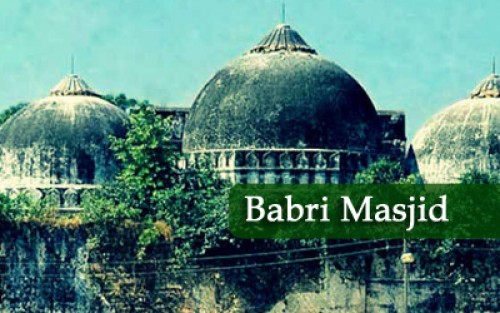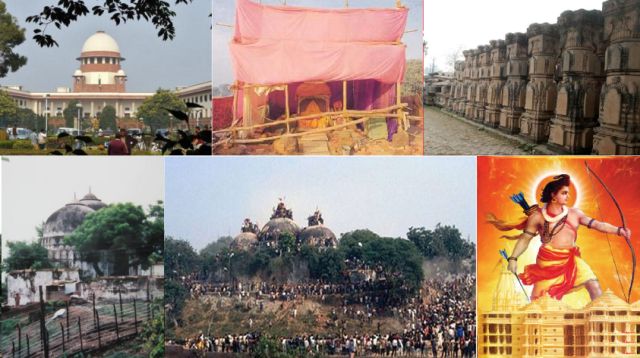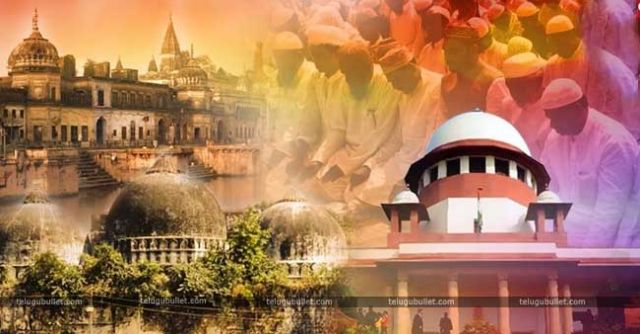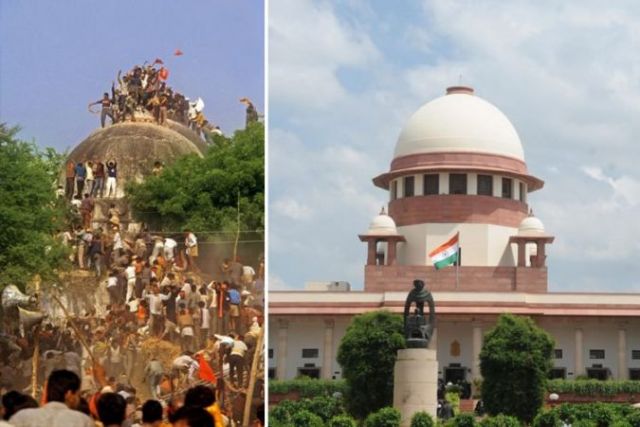
by admin | May 25, 2021 | News, Politics

Babri Masjid
New Delhi: The mediation panel in the Ayodhya land dispute case will submit status report in a sealed cover on Thursday in compliance with the Supreme Court’s earlier order.
A Supreme Court bench, led by Chief Justice of India Ranjan Gogoi, will hear the matter on August 2.
The Supreme Court had on July 18 asked the mediation committee on the Ram Janmabhoomi-Babri Masjid land dispute to continue the process and submit a report on the progress made till July 31.
A Constitution bench comprising Chief Justice Ranjan Gogoi and Justices SA Bobde, DY Chandrachud, Ashok Bhushan and S Abdul Nazeer observed that it will take a call on August 2 on whether a hearing is required in the case.
The order came after former Supreme Court judge FMI Kalifulla, chairperson of the three-member mediation panel, submitted a status report. The court, after perusing the report, directed the committee to inform it about the progress made in the mediation till July 31.
On March 8, the court had constituted the panel which also comprises Art of Living founder Sri Sri Ravi Shankar and senior Madras High Court advocate Sriram Panchu.
Fourteen appeals are pending before the apex court against the 2010 Allahabad High Court verdict which ordered equal division of the 2.77-acre disputed land in Ayodhya among the Sunni Waqf Board, the Nirmohi Akhara and Ram Lalla.
The 16th-century Babri Masjid was demolished on December 6, 1992.

by admin | May 25, 2021 | News, Politics
 Lucknow : The Babri Masjid Action Committee (BMAC) has decided to file a petition in the Supreme Court in case the Narendra Modi-led NDA government at the Centre brings in an ordinance paving way for the construction of a grand Ram temple at the disputed site in Ayodhya, an office-bearer said on Wednesday.
Lucknow : The Babri Masjid Action Committee (BMAC) has decided to file a petition in the Supreme Court in case the Narendra Modi-led NDA government at the Centre brings in an ordinance paving way for the construction of a grand Ram temple at the disputed site in Ayodhya, an office-bearer said on Wednesday.
He said the BMAC took the decision at a meeting on Tuesday.
The move comes ahead of the January 4 hearing by the apex court on the matter.
While right-wing groups and the Rashtriya Swayamsewak Sangh (RSS) have been pressing for the ordinance, the opposition has been seeking a court verdict on the contentious issue.
One of the 70 persons, who attended the meeting, said it was a routine one and had no specific agenda. Though the possibility of the Modi government bringing in an ordinance or a legislation on the temple issue was discussed.
Convenor of the BMAC Zafaryab Jilani said the committee would also urge the Supreme Court to not rush through the matter and pronounce a verdict only after going through all aspects and studying all relevant papers and documents.
The BMAC members were also of the view that the Bharatiya Janata Party’s (BJP) electoral defeats in three states, the whipping up of passion on the temple issue and the pro-temple statements by senior BJP leaders, including Uttar Pradesh Chief Minister Yogi Adityanath, could not be taken in isolation or lightly.
—IANS

by admin | May 25, 2021 | News, Politics
 New Delhi : By a majority 2-1 judgement that could hasten the process of hearing in the vexed Ramjanambhoomi-Babri Masjid dispute, the Supreme Court on Thursday rejected a plea for referring the issue to a larger Constitution Bench and referred the case to a three-judge bench to be set up that will begin hearing from October 29.
New Delhi : By a majority 2-1 judgement that could hasten the process of hearing in the vexed Ramjanambhoomi-Babri Masjid dispute, the Supreme Court on Thursday rejected a plea for referring the issue to a larger Constitution Bench and referred the case to a three-judge bench to be set up that will begin hearing from October 29.
“We are of the considered opinion that no case has been made out to refer the Constitution Bench judgment of this court in Ismail Faruqui case for reconsideration,” said Justice Ashok Bhushan, reading the judgement on behalf of himself and Chief Justice Dipak Misra, who headed Thursday’s three-judge bench.
The bench was giving its verdict on petitions by some Muslims who had pleaded that the 2010 judgement of the Allahabad High Court splitting the title dispute into three parts be heard by a Constitution Bench as it involved reconsideration of a 1994 ruling by a five-judge bench of the apex court which had held that mosque was not an essential part of Islam to offer namaz.
Thursday’s order assumes significance in view of the fact that a possible early judgement in the case could have implications in the 2019 Lok Sabha elections as the Ayodhya dispute has been a major electoral issue in the last over 30 years.
The petitioners had contended that while deciding the title suit in 2010, the Lucknow bench of the Allahabad High Court had referred to the observations made in the 1994 judgement by the five-judge bench.
However, in a dissenting ruling, Justice Abdul Nazeer said the judgement in the 1994 Ismail Faruqui case needed reconsideration and the matter should be referred to a larger Constitution bench.
The majority judgement on Thursday held that a newly constituted bench will commence hearing from October 29 on a batch of petitions filed by both the sides — Hindu and Muslim stakeholders — challenging the 2010 judgement trifurcating the disputed site into three parts for Ram Lalla, Nirmohi Akhara and the original Muslim litigant.
“To conclude, we again make it clear that questionable observations made in Ismail Faruqui’s case as noted above were made in context of land acquisition. Those observations were neither relevant for deciding the suits nor relevant for deciding these appeals,” Justice Bhushan said.
“The issues, which have arisen in these appeals (Ramjanambhoomi-Babri Masjid) are no doubt important issues, which have to be heard and decided in these appeals. Normally appeals arising out of suits are placed before a bench of two judges but looking to the importance of the matter, the present appeals have already been placed before three-judge bench.
“For the aforesaid reasons, we do not agree with the submission of petitioner that these appeals be referred to Constitution Bench of five judges to reconsider the constitution bench judgment in Ismail Faruqui’s case,” Justice Bhushan said in the verdict.
In his minority judgement, Justice Nazeer said “questionable” observations in the Ismail Faruqui ruling were arrived at without undertaking a comprehensive examination and they had permeated the judgement in the main Ayodhya title suit.
He said a Constitution Bench must decide what constitutes essential practices of a religion and thereafter the Ayodhya land dispute should be heard.
Justice Nazeer also said that whether mosque was an essential part of Islam for offering namaz was to be decided considering the religious beliefs and requires detailed consideration.
“It is clear from the aforesaid decisions that the question as to whether a particular religious practice is an essential or integral part of the religion is a question which is to be considered by considering the doctrine, tenets and beliefs of the religion. It is also clear that the examination of what constitutes an essential practice requires detailed examination as reflected in the aforesaid judgments,” Justice Nazeer said.
He also said that the question of the 1994 Ismail Farooqi judgement needed to be referred to a larger Constitution Bench.
—IANS

by admin | May 25, 2021 | News, Politics
 New Delhi : The Supreme Court will likely pronounce on Thursday its verdict on the plea by Muslim litigants seeking direction that a larger Constitution bench hear the batch of petitions challenging the 2010 Allahabad High Court verdict which directed splitting into three parts the disputed site at Ayodhya in Uttar Pradesh.
New Delhi : The Supreme Court will likely pronounce on Thursday its verdict on the plea by Muslim litigants seeking direction that a larger Constitution bench hear the batch of petitions challenging the 2010 Allahabad High Court verdict which directed splitting into three parts the disputed site at Ayodhya in Uttar Pradesh.
The bench of chief Justice Dipak Misra, Justice Ashok Bhushan and Justice S. Abdul Nazeer reserved the verdict on the plea by the Muslim litigants seeking reconsideration of the part of 1994 top court judgement which had said that “mosque was not essential to Islam for offering namaz”.
The judgment was reserved on July 20.
The Lucknow bench of the Allahabad High Court in its September 30, 2010, verdict ordered that the disputed site be divided into three parts — one for deity (Ramlala Virajmaan), another for Nirmohi Akhara — a Hindu sect — and third to the original litigant in the case for the Muslims.
The Uttar Pradesh government, which is not a party in the title suit, had questioned the Muslim litigants in the Ramjanmabhoomi-Babri Masjid title suit case for making “belated efforts” seeking a relook at the 1994 Ismail Farooqui judgment that had said that mosques were not an integral part of religious practice of offering prayers.
The State government had said that the Muslim parties did not question the legality of the 1994 judgement till the appeal against 2010 Allahabad High Court judgment on the ownership of the disputed land was taken up for hearing by the top court.
During the course of the hearing Justice Bhushan had observed that nobody was questioning that mosque is essential to Islam, but the question is whether offering namaz in mosque was essential.
The Hindu parties said that reference to 1994 judgement in the hearing of the title suit in no way impacted the 2010 High Court judgment.
The court was told that the birthplace of Lord Ram cannot be shifted to another site, while a mosque with no particular religious significance to the Muslims can be shifted as that will “not affect the right to practice religion by offering ‘namaz’ in other mosques”.
To go to pilgrimage is a practice of religious faith both for the Muslims and the Hindus as well, but for the Muslims, “Mecca and Medina alone are places of particular significance” as pilgrimage centres, but for them such was not the case with Ayodhya/Babri Masjid.
—IANS

by admin | May 25, 2021 | News, Politics
 New Delhi : The Supreme Court on Friday was told that just as the statue of Bamiyan Buddha was destroyed by the Afghan Taliban, similarly the Hindu Taliban razed the Babri Masjid in Ayodhya on December 6, 1992.
New Delhi : The Supreme Court on Friday was told that just as the statue of Bamiyan Buddha was destroyed by the Afghan Taliban, similarly the Hindu Taliban razed the Babri Masjid in Ayodhya on December 6, 1992.
“Just as Bamiyan Buddha was destroyed by Afghan Taliban, same way Babri Masjid was destroyed by Hindu Taliban,” the bench of Chief Justice Dipak Misra, Justice Ashok Bhushan and Justice S. Abdul Nazeer was told by senior counsel Rajeev Dhavan.
“No faith has a right to destroy a mosque,” Dhavan said, assailing the argument by the Hindu side that no equity survived once the mosque had gone (razed).
“It can’t be, should not be argued that no equity lies and there is nothing left to be decided once it (mosque) has been destroyed,” Dhavan told the bench.
Dhavan said this to the three-judge bench while advancing arguments that the 1994 top court judgment that had said that offering namaz in a mosque was not an essential practice of Islam needed to be revisited.
“The question of essential practice was totally alien to the case before the top court bench in 1994,” he said.
Appearing for the lead petitioner M. Siddiqui represented by his legal heir, Dhavan assailed the Uttar Pradesh government for abandoning its neutrality and pointing fingers at Muslim litigants for making “belated efforts” seeking a relook at the 1994 Ismail Farooqui judgment that had said that mosques were not an integral part of religious practice of offering prayers.
He told the court that the neutrality had been broken by the Uttar Pradesh government which was represented by the Additional Solicitor General – a law officer of the Central government which is the receiver of the disputed land.
Describing the shift in the stand of the Uttar Pradesh government as a “breach of faith”, Dhavan said that there was no delay on the part of the Muslim litigants in flagging the issue and they did it in the first instance when the opportunity arose.
It were the Hindu litigants who had relied upon the 1994 judgment during the hearing of the title suit of the disputed site before the Lucknow bench of Allahabad High Court.
The senior counsel took exception to senior counsel K. Parasaran telling the court on May 17 that for Muslims “Makkah and Madinah alone are places of particular significance” as pilgrimage centres but such was not the case with Ayodhya/Babri Masjid.
Describing it as invidious argument, Dhavan said this meant that for the Muslims and Christians, their centre of pilgrimages were overseas and thousands of churches and mosques could be closed.
This also amounted to saying that Hindus were protected by the Article 25 of the constitution but not the Muslims and Christians and “We (the Hindus) are superior and everything belongs to us”.
Dhavan described as an indulgent act of “charity” the offer by the Shia Waqf Board to move out of the disputed site in return for a site for a new mosque.
He said the 1994 judgment needed to be revisited as the Lucknow bench of Allahabad High Court relied on this in deciding the Ayodhya title suit by which the disputed 2.77 acres site was ordered to be divided between the Nirmohi Akhara, the Lord Ram deity and the Sunni Waqf Board.
The top court is hearing a batch of cross petitions challenging the 2010 Allahabad High Court judgment by which it had divided the disputed 2.77 acres site between the Nirmohi Akhara, the Lord Ram deity and the Sunni Waqf Board.
—IANS





